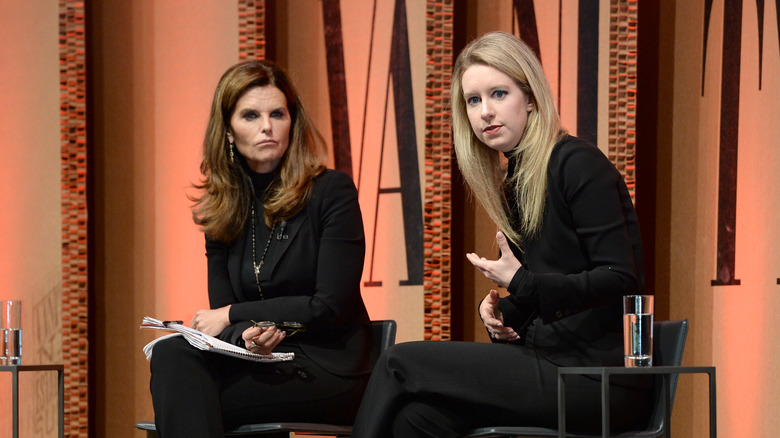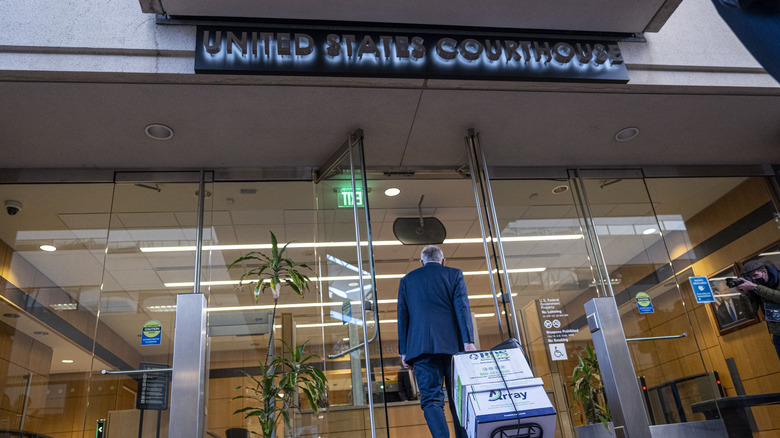The Theranos Scandal Explained
When you're suffering a mysterious illness, experiencing a vitamin deficiency, adjusting to medication, or even just getting a check on your health, you go to the doctor and get your blood drawn. We use blood tests for everything from pregnancy to drug use to cancer diagnoses, and it's an industry worth $75 billion a year, Vox reports. Elizabeth Holmes' biotech startup Theranos wanted to change that.
In the spirit of moving fast and breaking things, Theranos, offering to disrupt a massive medical technology industry, was founded in 2003 by Elizabeth Holmes and quickly skyrocketed to a $10 billion valuation by 2013 and 2014, raising over $700 million in venture capital (via Forbes). Theranos promised to simplify and streamline the expensive, arduous process of lab testing blood samples, which, at its current rate, can cost an uninsured patient over $1,000 just to test for diseases (via Advisory Board). Theranos' proposed blood analysis machine, the Edison, could conduct these medical tests for you directly in your home. Instead of a phlebotomist jabbing you with a needle, Theranos promised the Edison could run tests on just a self-conducted finger prick of blood.
Easy. Promising. Efficient. Cheap. Innovative. Smart, right? There's just one problem: the Edison doesn't work.
How to Get Charged with Wire Fraud
In a startup milieu with slogans like "fail fast, fail forward," failure itself is most certainly not a crime in Silicon Valley. In fact, you'd be hard-pressed to find anything startups do better. So where did Theranos go wrong?
In October 2015, The Wall Street Journal published an investigative report on Theranos's product and operations that sent shockwaves through the investing world and had Theranos, for lack of a better word, hemorrhaging millions in valuation. At its foundation, the Theranos scandal is largely rooted in the grievance that Holmes and others exaggerated Edison's capabilities and pitched product features that were, at times, downright fictional.
It turns out the Edison device and Elizabeth Holmes' "nanotainers" (blood collection devices) were not reliable and failed to produce consistent results. Worse, the company knew this and often outsourced testing to be done by other products (or by the traditional means of lab testing, which, ironically, Theranos had promised to make obsolete). Additionally, the device did not receive sufficient FDA approval, and Holmes told investors that it did (via The Washington Post). On top of that, it turns out that a large number of Theranos' claims about what its product could do were not exactly verified, not scholarly-reviewed, not credible, and never really had been (per Forbes).
This isn't rare when it comes to promises made by startups, but the medical testing industry is big, and Theranos raised a lot of money. By outsourcing test results and failing to disclose inaccuracies that could have huge consequences for people with health problems, Theranos didn't exactly advertise its product with accuracy. And when faced with scrutiny from scholars, journalists, and even some investors, Theranos didn't come clean — it doubled down (via Business Insider). Theranos did not fail fast, nor forward, but instead, regrettably, committed fraud.
Science, Sex, And Silicon Valley
Elizabeth Holmes and former company president Ramesh "Sunny" Balwani are currently being charged with wire fraud and conspiracy by the U.S. Attorney for the Northern District of California. The trial, which began in August 2021, is receiving a lot of attention. Some view the trial as a microcosm adjudicating the legal legitimacy of Silicon Valley itself and its culture of big promises now, underwhelming results later. Additionally, as a woman, Elizabeth Holmes is an icon people love to hate, subject to the same tropes we often witness when prominent women are portrayed more harshly than men as "liars" or "imposters." (The arc of the Theranos saga fits these tropes all too well, as NPR notes.) Additionally, she really did misrepresent some pretty serious things (like the accuracy of test results).
And it turns out, this made a lot of people mad, including the California government. So that's how you end up in court for conspiracy and wire fraud, and head of a company that went from billion-dollar to bankrupt. Don't try this at home. And maybe don't try a Theranos blood test.


